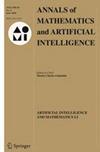A category theory approach to the semiotics of machine learning
IF 1.2
4区 计算机科学
Q4 COMPUTER SCIENCE, ARTIFICIAL INTELLIGENCE
Annals of Mathematics and Artificial Intelligence
Pub Date : 2024-02-09
DOI:10.1007/s10472-024-09932-y
引用次数: 0
Abstract
The successes of Machine Learning, and in particular of Deep Learning systems, have led to a reformulation of the Artificial Intelligence agenda. One of the pressing issues in the field is the extraction of knowledge out of the behavior of those systems. In this paper we propose a semiotic analysis of that behavior, based on the formal model of learners. We analyze the topos-theoretic properties that ensure the logical expressivity of the knowledge embodied by learners. Furthermore, we show that there exists an ideal universal learner, able to interpret the knowledge gained about any possible function as well as about itself, which can be monotonically approximated by networks of increasing size.
机器学习符号学的范畴理论方法
机器学习,特别是深度学习系统的成功,导致了人工智能议程的重新制定。该领域的一个紧迫问题是从这些系统的行为中提取知识。在本文中,我们提出了一种基于学习者形式模型的行为符号学分析方法。我们分析了确保学习者所体现知识的逻辑表达性的拓扑理论属性。此外,我们还证明了存在一种理想的通用学习器,它能够解释所获得的关于任何可能函数的知识以及关于自身的知识,这种学习器可以通过规模不断增大的网络单调地近似。
本文章由计算机程序翻译,如有差异,请以英文原文为准。
求助全文
约1分钟内获得全文
求助全文
来源期刊

Annals of Mathematics and Artificial Intelligence
工程技术-计算机:人工智能
CiteScore
3.00
自引率
8.30%
发文量
37
审稿时长
>12 weeks
期刊介绍:
Annals of Mathematics and Artificial Intelligence presents a range of topics of concern to scholars applying quantitative, combinatorial, logical, algebraic and algorithmic methods to diverse areas of Artificial Intelligence, from decision support, automated deduction, and reasoning, to knowledge-based systems, machine learning, computer vision, robotics and planning.
The journal features collections of papers appearing either in volumes (400 pages) or in separate issues (100-300 pages), which focus on one topic and have one or more guest editors.
Annals of Mathematics and Artificial Intelligence hopes to influence the spawning of new areas of applied mathematics and strengthen the scientific underpinnings of Artificial Intelligence.
 求助内容:
求助内容: 应助结果提醒方式:
应助结果提醒方式:


